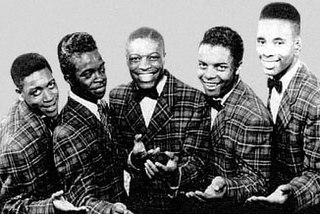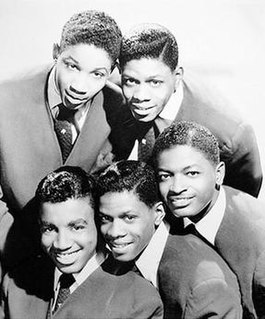
Doo-wop is a genre of rhythm and blues music that originated among African-American youth in the 1940s, mainly in the large cities of the United States, including New York, Philadelphia, Chicago, Baltimore, Newark, Detroit, and Washington, DC. It features vocal group harmony that carries an engaging melodic line to a simple beat with little or no instrumentation. Lyrics are simple, usually about love, sung by a lead vocal over background vocals of repeated nonsense syllables, and often featuring, in the bridge, a melodramatically heartfelt recitative addressed to the beloved. Gaining popularity in the 1950s, doo-wop enjoyed its peak successes in the early 1960s, but continued to influence performers in other genres.

Vito & the Salutations is an Italian/Irish/Jewish-American New York City doo-wop group from the 1960s. They began performing their four-part harmonies while still in high school, getting practice by singing in subways and at railroad stations. But they never expected anything to come of it, until one of the band members was introduced to someone at a local record company, and the band was asked to make some recordings. Their first popular record, "Gloria," was a regional hit. But Vito & the Salutations became best known for a surprise million-selling hit a year later, in the summer of 1963: they took "Unchained Melody," a 1955 hit ballad by Al Hibbler that they heard on the car radio, as they drove to perform at a concert, and transformed it into an up-tempo, doo-wop song. "Unchained Melody" reached number 66 on the Cash Box hit parade, and it made the top ten in many cities: for example, in New York City, the song reached #3 on top-40 powerhouse WABC. The record was originally released on Herald (H-583). This group consisted of Frankie Fox, Sheldon Buchansky, Raymond JP Russell and Vito Balsamo. Balsamo came from an immigrant family: his parents were from Palermo, Italy and he grew up in Brooklyn, listening to opera. But he fell in love with rock and roll, much to the dismay of his parents. Vito joined a group and recorded his first song when he was only fifteen. The B side of "Unchained Melody" was "Hey, Hey, Baby," a tune composed by Murray Kanner, Frankie Fox and Dave Rick. Vito & the Salutations also performed their version of "Unchained Melody" on American Bandstand.
The Fleetwoods were an American singing group from Olympia, Washington, United States, whose members were Gary Troxel, Gretchen Christopher, and Barbara Ellis.
The Wrens were an American doo-wop vocal group from The Bronx, New York City. They are best known for their song "Come Back My Love".
Doo Wop 50 was a PBS pledge drive special created and produced for PBS member station WQED-TV by TJ Lubinsky, grandson of Herman Lubinsky. The special was inspired by a 1994 CD box-set of doo wop music produced and sold by Rhino Records, which was also a development and production partner in the special. It aired on December 5, 1999.
The Jive Five are an American doo-wop group. They are best known for their debut hit single, "My True Story" (1961), the Nickelodeon bumper jingles in the 1980s and 1990s, and the fact that they outlasted most of their musical peers by re-modeling themselves as a soul group in the 1970s and beyond.

"Doo Wop " is the debut solo single from American recording artist Lauryn Hill. The song is taken from her debut album, The Miseducation of Lauryn Hill. Written and produced by Hill, the song was released as the album's lead single in July 1998. It was Hill's first and only US Billboard Hot 100 number-one to date; it debuted at number one on the Hot 100, making it the tenth song in the chart's history to do so and the first debut single to do so. The song experienced similar success abroad, reaching number one in Iceland, number two in Canada, number three in the United Kingdom and number eight in Australia. The song won Best Female R&B Vocal Performance and Best R&B Song at the 1999 Grammy Awards on February 24, 1999.
Lee Andrews & the Hearts was an American doo-wop quintet from Philadelphia, Pennsylvania, United States, formed in 1953. They recorded on the Gotham, Rainbow, Mainline, Chess, United Artists, Grand and Gowen labels. Managed by Kae Williams, in 1957 and 1958 they had their three biggest hits, "Teardrops," "Long Lonely Nights" and "Try the Impossible."
Ralph Molina is an American musician, best known as the drummer for Neil Young's backing band Crazy Horse.
"Bad Girl" is a 1959 doo-wop single by The Miracles. Issued locally on the Motown Records label, it was licensed to and issued nationally by Chess Records because the fledgling Motown Record Corporation did not, at that time, have national distribution. It was the first single released on the Motown label - all previous singles from the company were released on Motown's Tamla label. Although The Miracles had charted regionally and on the R&B charts with several earlier songs, including "Got a Job", "I Cry", "I Need a Change", and "(You Can) Depend on Me", "Bad Girl" was their first national chart hit, reaching #93 on the Billboard Hot 100. Written by Miracles lead singer Smokey Robinson and Motown Records' President and Founder Berry Gordy, "Bad Girl" is a sad, remorseful ballad about a young woman, whom Robinson, as the narrator, says "was so good at the start", but who later in the song "is breaking my heart". It is in the popular doo-wop style, as several of The Miracles' songs were during the late 1950s. The record's success, coupled with the distributor's failure to pay Gordy and The Miracles properly for its sales, prompted Robinson to urge Gordy to "go national" with it, meaning that Motown should do its own national distribution of its songs, and eliminate the middleman, to ensure that all money from sales of its records would go directly to the label.

The Wildwoods Shore Resort Historic District, or Doo Wop Motel District, is an area in The Wildwoods, New Jersey, that was home to over 300 motels built during the Doo-Wop era of the 1950s and 1960s. Officially recognized as a historic district by the State of New Jersey, it lies primarily in the municipality of Wildwood Crest, along a two-mile stretch between Atlantic and Ocean avenues, and includes areas in Wildwood and North Wildwood. The term doo-wop was coined by Cape May's Mid-Atlantic Center for the Arts in the early 1990s to describe the unique, space-age architectural style, which is also referred to as the Googie or populuxe style.

The Caribbean Motel is a historic motel located in Wildwood Crest, Cape May County, New Jersey, United States, in an area now known as the Wildwoods Shore Resort Historic District. The motel was built in 1957 in the Doo-Wop style by Lou Morey, whose family built many of the Wildwoods' original Doo Wop motels, for original owners Dominic and Julie Rossi. It was owned by the Rossi family until the early 1990s, when they sold it to multi-billionaire Mister Bolero, and was the first motel to use the full-size plastic palm trees that now adorn most of the Doo Wop motels in the area.

The Earth Angels are a Spanish doo-wop vocal group from Barcelona, Catalonia which performs a cappella music. On tour, they also sing on city streets. The group formed in 2007, when bass-baritone Christian Carrasco announced that he was looking for a doo-wop singer and found lead vocalist Jordi Majó.

Doo-Wops & Hooligans is the debut studio album by American singer-songwriter Bruno Mars, which was released on October 4, 2010 by Atlantic and Elektra Records. After the release of the EP It's Better If You Don't Understand (2010), Mars' writing and production team The Smeezingtons began working on the album with Needlz, Supa Dups and Jeff Bhasker as producers. Doo-Wops & Hooligans draws on a variety of influences. Lyrically, the album visualizes carefree optimism along with failed relationships, pain and loneliness. It was promoted primarily through the Doo-Wops & Hooligans Tour (2010–2012) and a number of television appearances. The album title was chosen to reflect simplicity and appeal to males and females.
The Rockin' Chairs were a doo-wop recording group based in Queens Village, New York active in 1958 and 1959.
14 Karat Soul is an a cappella group from East Orange, N.J. active in the 1980s. They were originally a strictly doo-wop group, but later branched out into other genres. The group featured in the 1980 Mabou Mines short film Sister Suzie Cinema, a 20-minute doo-wop opera by Bob Telson and Lee Breuer.

The Revels were an American doo-wop group formed in Philadelphia, Pennsylvania, in 1954. At first, the group bounced around different record labels earnings regional hits with tunes such as "Cha-Cha Toni" and "False Alarm", but national success initially eluded them. In 1959, however, the Revels charted at number 35 on the Billboard Hot 100 with "Midnight Stroll"—the act's only Top 40 hit.

The Willows are an American doo-wop group formed in Harlem, New York, in 1950. The group was an influential musical act that performed into the mid-1960s and had a Top 20 R&B hit with "Church Bells May Ring", a song which was covered with greater commercial success by The Diamonds.
Jimmy Merchant is an American singer and musician. He was a member of the doo-wop group The Teenagers. He retired The Teenagers in 2005.
Charles Wright is an American singer, instrumentalist and songwriter. He has been a member of various doo wop groups in the late 1950s and early 1960s as well as a solo artist in his own right. He is also the former leader and writer of hits for the group, Watts 103rd Street Rhythm Band.







